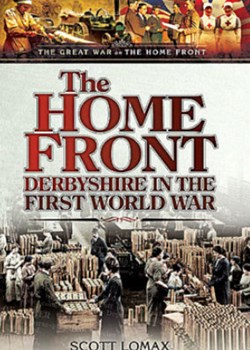The Home Front: Derbyshire in the First World War
- Home
- World War I Book Reviews
- The Home Front: Derbyshire in the First World War

Author: Scott Lomax
Pen and Sword Books Ltd, Barnsley, 2016
When the servicemen were demobilised in 1919 they returned to a Britain that was very different to that which they had been fighting for. Industrial expansion, changes to the status of women, changing attitudes to the class system and plans for major housing developments to replace the overcrowded homes that were not fit for human habitation, were among the most notable changes.
Men had difficulty adapting to those changes, especially having lived by a military lifestyle for up to four and a half years. They had to adapt to civilian life, and society had to adapt to meet the needs of its returned soldiers. Shell shock and other psychological disorders were little understood by the medical profession let alone by friends and families of the sufferers of such afflictions who expected life to return to normal once their loved ones came home. And then of course there was the enormous amount of soldiers who never came home. The loss of human life was felt all over Britain and so also in Derbyshire.
For the first time in its history, the people of Derbyshire realised that the horrors of war were not confined to overseas battles but they could be witnessed and experienced in their own neighbourhoods.
'The Home Front: Derbyshire in the First World War' by Scott Lomax details the human experiences, thoughts, concerns, fears and hopes of the county during one of the most important periods of its history.
Much has been written about the First World War and the involvement of the people of Derbyshire on the Front Line. Comparatively little, however, has been written about the efforts of the civilian population of Derbyshire. Therefore the author felt that during the commemoration of the Great War, whilst paying our respects to those who were killed serving their country, it was necessary that the impact that the war had on those at home and the civilian efforts which made victory possible were recognised by writing this book.
All aspects of civilian life are featured in this book, including the run up to war and the reaction to its outbreak; the recruitment of men to the forces; the efforts of those that could not fight; the impact on agriculture and the role of farmers in feeding the nation but also food shortages and rationing; the role of women and the role of the county in helping wounded servicemen and providing comforts and funds for those overseas.
Other paragraphs are on Belgian refugees, conscientious objectors, an alleged plot to kill the Prime Minister, anti-German feeling, hostility to Germans living in the county, prisoners of war, civil defence and a Zeppelin raid that brought destruction, fear and death.
In the end the author writes about the influenza epidemic which killed thousands of people in Sheffield as the war came to an end. Also he doesn’t forget to write about the social and economic legacy of the war, which helped mould the country into what it is today.
The First World War saw many changes to Derbyshire that helped shape what the county is today.
Sons, brothers, husbands, fathers and friends out of Derbyshire were lost. The effect was felt on businesses and industry with large numbers of skilled employees having been killed resulting in a skills shortage which was to affect the future industrial success of the nation. Their absence was felt for decades and families faced extra financial hardship as well as the trauma of bereavement. The price paid by the Derbyshire people was high but of course that was the case for the whole of Britain.
The author Scott Lomax is a lifelong resident of Derbyshire and is passionate about the history of the county.
Scott is also the author of ‘The Home Front: Sheffield in the First World War’.
Part of an article in the Derby Mercury of 1 February 1918 read “we are making history every day. And some of our local history will be by no means the least interesting for the future generations to read”.
By writing this book Scott Lomax added a new part to the conservation of this history. Generations to come will benefit from his work; not only the people living in Derbyshire but everyone interested in the history of the First World War.
Dr. Giovanni Timmermans





